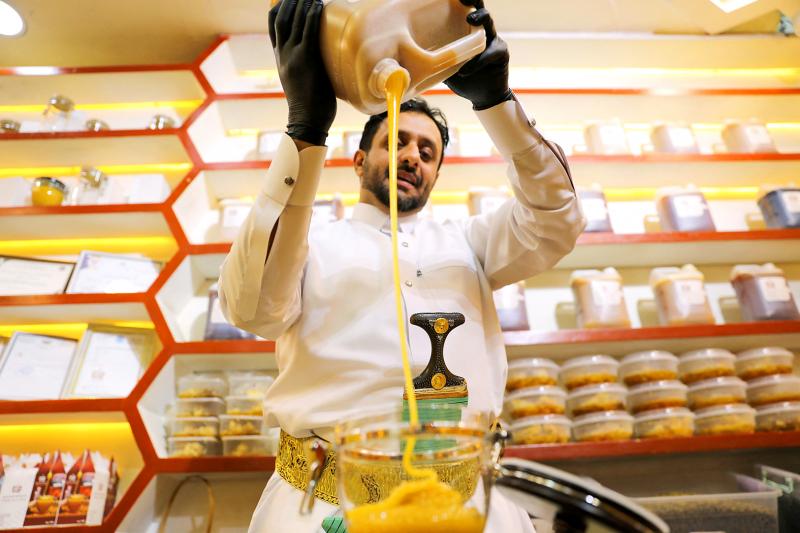Idrees al-Haddad used to buy 7kg tubs of Yemen’s world-famous honey when he went shopping. Today he can only afford 1kg.
Like many Yemenis suffering the extreme inflation and salary losses of a seven-year war, Haddad’s reduced consumption has left the industry with a production surplus.
“Merchants used to come to us to buy honey from our houses, from the valley apiaries. Nowadays we go to the market — but there isn’t demand,” said beekeeper Amin Hussein amid his insects at Wadi Dhahr in Sana’a Province.

Photo: Reuters
The bees crawl and buzz around cabinet-like wooden hives, feeding on almond tree flowers.
In the capital, Sana’a, shopkeeper Faris al-Houri said honey prices have fallen 30 to 40 percent from last year, when prices were already low.
“Border crossings are closed, shipping and export have stopped... Demand is non-existent,” al-Houri said, adding that people can barely afford food, never mind honey.
In Sana’a’s upmarket honey shops, vendors scoop up the light, dark, clear and opaque honeys reputed for their taste and medicinal properties. They tease the viscous liquids around spoons for customers to try.
“Our commercial trade has almost halted,” vendor Helmi al-Marhebi said.
Yemen’s honey industry faces many challenges. Frontlines, landmines and fuel shortages hamper farmers transporting colonies to feed on seasonal plants. Climate change is also seen as a problem.
Abdullah Yarim, chairman of an industry organization, said war has reduced access to markets in wealthy Gulf states.
Saudi Arabia, which leads a pro-government coalition fighting the Iran-aligned Houthis who control Sana’a and northern Yemen, maintains an air, sea and land blockade on Houthi territory.
Import packaging standards also constrain exports, Yarim said.
In the United Arab Emirates, a regional trade hub and coalition member, 1kg of top-end Yemeni Sidr honey can retail for about 2,000 Emirati dirhams (US$$545).
Haddad paid just 30,000 Yemeni rials (US$120) for his 1kg of Sidr honeycomb.
“No Yemeni house used to lack honey,” customer Ibrahim al-Sanafi said.

ECONOMIC WORRIES: The ruling PAP faces voters amid concerns that the city-state faces the possibility of a recession and job losses amid Washington’s tariffs Singapore yesterday finalized contestants for its general election on Saturday next week, with the ruling People’s Action Party (PAP) fielding 32 new candidates in the biggest refresh of the party that has ruled the city-state since independence in 1965. The move follows a pledge by Singaporean Prime Minister Lawrence Wong (黃循財), who took office last year and assumed the PAP leadership, to “bring in new blood, new ideas and new energy” to steer the country of 6 million people. His latest shake-up beats that of predecessors Lee Hsien Loong (李顯龍) and Goh Chok Tong (吳作棟), who replaced 24 and 11 politicians respectively

Archeologists in Peru on Thursday said they found the 5,000-year-old remains of a noblewoman at the sacred city of Caral, revealing the important role played by women in the oldest center of civilization in the Americas. “What has been discovered corresponds to a woman who apparently had elevated status, an elite woman,” archeologist David Palomino said. The mummy was found in Aspero, a sacred site within the city of Caral that was a garbage dump for more than 30 years until becoming an archeological site in the 1990s. Palomino said the carefully preserved remains, dating to 3,000BC, contained skin, part of the

Russian hackers last year targeted a Dutch public facility in the first such an attack on the lowlands country’s infrastructure, its military intelligence services said on Monday. The Netherlands remained an “interesting target country” for Moscow due to its ongoing support for Ukraine, its Hague-based international organizations, high-tech industries and harbors such as Rotterdam, the Dutch Military Intelligence and Security Service (MIVD) said in its yearly report. Last year, the MIVD “saw a Russian hacker group carry out a cyberattack against the digital control system of a public facility in the Netherlands,” MIVD Director Vice Admiral Peter Reesink said in the 52-page

‘WATER WARFARE’: A Pakistani official called India’s suspension of a 65-year-old treaty on the sharing of waters from the Indus River ‘a cowardly, illegal move’ Pakistan yesterday canceled visas for Indian nationals, closed its airspace for all Indian-owned or operated airlines, and suspended all trade with India, including to and from any third country. The retaliatory measures follow India’s decision to suspend visas for Pakistani nationals in the aftermath of a deadly attack by shooters in Kashmir that killed 26 people, mostly tourists. The rare attack on civilians shocked and outraged India and prompted calls for action against their country’s archenemy, Pakistan. New Delhi did not publicly produce evidence connecting the attack to its neighbor, but said it had “cross-border” links to Pakistan. Pakistan denied any connection to